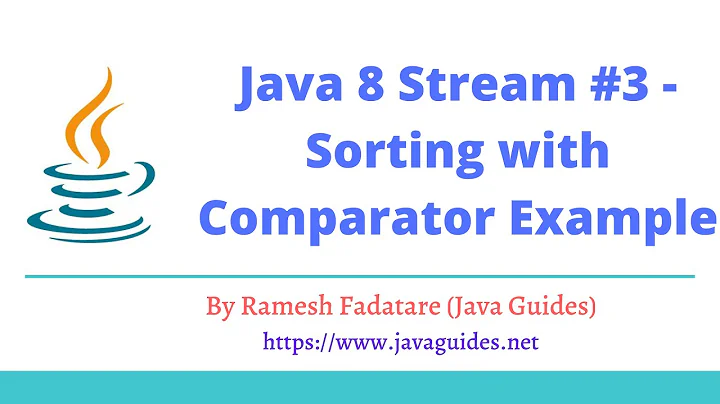Dealing with a null attribute using java 8 streams and sorting using lambda expressions
Solution 1
All of the answers here revolve around "throw out the bad elements, those that have a null getParentId()." That may be the answer, if they are indeed bad. But there's another alternative: Comparators.nullsFirst (or last.) This allows you to compare things treating a null value as being less than (or greater than) all non-null values, so you don't have to throw the elements with a null parentId away.
Comparator<Entity> cmp = nullsLast(comparing(Entity::getParentId));
List<Entity> list = list.stream().sorted(cmp).collect(toList());
You can do a similar thing for filtering; define your predicate as:
Predicate<Entity> predicate = e -> e.getParentId() != null
&& e.getParentId() < 100;
Solution 2
Looks like you are looking for something like:
list.sort(Comparator.comparing(Entity::getParent,
Comparator.nullsLast(Integer::compareTo)));
All the elements with parent null will be put at the end and the rest will be sorted by their parent.
Solution 3
Try pre-filtering for non-null parentId values only:
result = list.stream().filter(e -> e.getParentId() != null).filter(predicate).collect(Collectors.toList());
[edit]
Just saw, that the attribute (e.parentId) seems the one being null. In that case, the second thing, the sorting, breaks. You are sorting the original list, not the filtered one. Try result.sort(comp), then you should avoid the NPE.
Solution 4
You can do it all in one Stream pipeline :
List<Entity> result =
list.stream()
.filter(e -> e.getParentId()!=null) // it's not clear if the null
// is the Entity object itself
// (in which case it should be e!=null)
// or just the ParentId member
.filter(predicate)
.sorted(comp)
.collect(Collectors.toList());
BTW, according to the text of your question, the original predicate should be :
Predicate<Entity> predicate = e -> e.getParentId() > 100; // not < 100
Solution 5
Harness the power of a method reference to make the code even more compact:
List<Entity> result =
list.stream()
.filter(Objects::nonNull)
.filter(predicate)
.sorted(comp)
.collect(Collectors.toList());
Related videos on Youtube
Manu Joy
Updated on January 25, 2020Comments
-
Manu Joy over 4 years
Let's consider a
Parentclass which contains only oneIntegerattribute. I created 6 objects of parent class and values of attribute are100, 20, 300, 400, 500, null.Now I added all the objects to a list(Name of list is list). Then I want to get the objects whose attribute value is greater than
100. I used Java 8 streams for this purpose.Predicate<Entity> predicate = e -> e.getParentId() < 100; result = list.stream().filter(predicate).collect(Collectors.toList());I also want to sort the list in descending order. I used the following code for this purpose.
Comparator<Entity> comp = (d1,d2) -> d2.getId().compareTo(d1.getId()); list.sort(comp);In both cases I get a
NullPointerException.How to handle this?
-
 Nir Alfasi almost 9 yearspossible duplicate of How should we manage jdk8 stream for null values
Nir Alfasi almost 9 yearspossible duplicate of How should we manage jdk8 stream for null values -
ajb almost 9 yearsI'm unclear... is it
ethat isnull, ore.getParentId()? Ife.getParentId()is declared as anInteger(the boxed type), it may be null. But then when it's converted to anintto compare it to 100, the result will be aNullPointerExceptionif it'snull.
-








